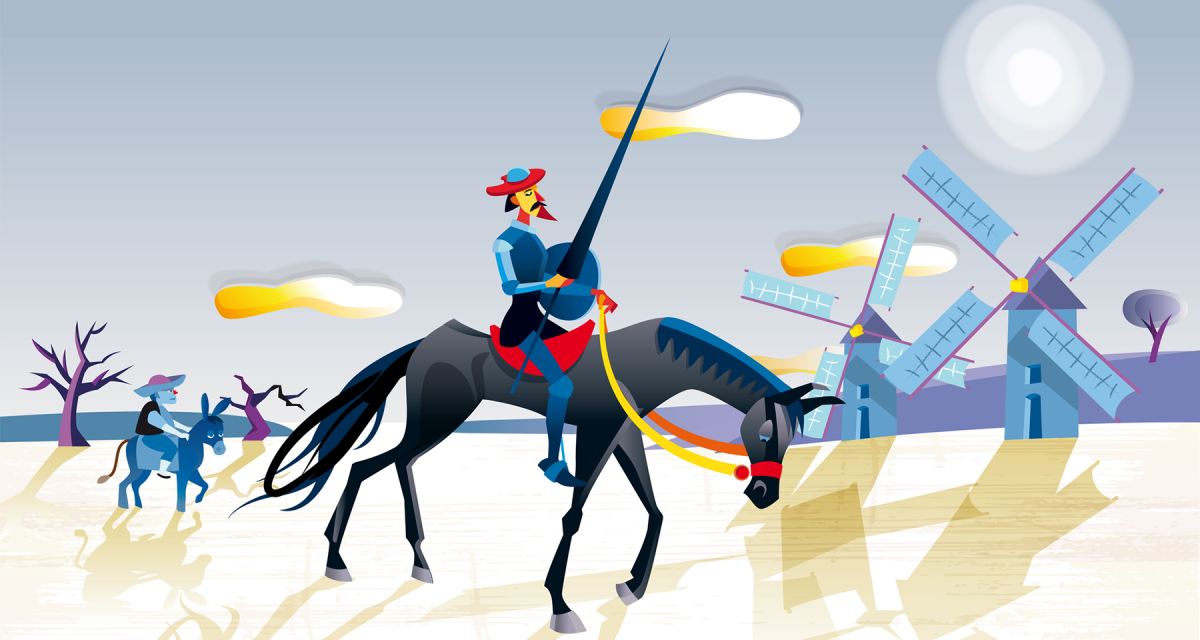Three lessons leaders can learn from Don Quixote about strategizing

The Spanish writer Miguel de Cervantes penned Don Quixote in the early 1600s. He could have little imagined how relevant its lessons would remain today, in an age of big data and machines. Yet the story of a quixotic figure who undertakes battles – within and without – to achieve an impossible dream continues to resonate.
Effective leadership is about homogenizing the visions and actions of team members. It usually results from convincing members to sacrifice their own benefit for the greater good. If a goal is noncontroversial and involves no trade-offs, there is no need for a leader. Success is determined by who can lure the best talents and then leave them alone to get things done.
Strategy, on the other hand, is about being different. Competitive advantage usually results from doing what your rivals cannot or do not want to do. If an opportunity is obvious and easy to capture, there is little scope for strategizing. Success is determined by who has the deepest pocket to buy off and deter competitors.
When we conceptualize strategizing as being contrarian and leadership as orchestrating the pursuit of a contrarian goal, Don Quixote offers at least three lessons for you to become an effective strategic leader.
First, you need to encourage "foolishness" in your team. Being foolish, according to the late management guru James G. March, is to become less sensitive to the immediate consequence of an action, just like Don Quixote, who remained undeterred by the numerous setbacks that occurred while pursuing his dream.
Being a contrarian does not guarantee success. Most ideas that deviate from the conventional are bad ideas, but it is almost impossible to tell which is which before engaging some of them. If you cannot tolerate the likely failures and performance declines when your team tries something novel, you will likely give up brilliant ideas prematurely. To encourage foolishness, my research shows that you should consider punishing the wrong types of successes (the successes that are familiar and predictable) and rewarding the right type of failures (the failures that sustain your searches of the contrarian approach that is both different and viable).
Second, you need to create a romantic identity for your team. A strong identity helps the team to differentiate themselves from the rest and isolates them from the social backlashes when being contrarian, just like Don Quixote, who romanticize himself as a knight and pursues unrealistic goals that are beyond crowds' imaginations.
A contrarian strategist can underperform for a long time before succeeding. Without the shield of a strong identity, your team is unlikely to survive the self-doubts and ridicules from outsiders. My research indicates that you should design a romantic story that defines your team's identity. The story may appear foolish to the uninformed but meaningful to your followers; your team may appear to be losers by conventional standards but is perfectly convinced that they are the noble knights who run where the brave dare not go.
Third, you as the leader need to know when to stop dreaming. This is where effective leaders depart from the analogy of Don Quixote, who is an inspirational but imperfect role model because he did not make any difference in the end.
Don Quixote is inspirational because most of us tend to dream and explore less than we should. But good leaders need to remain sober when preaching romantic foolishness to followers. My book on the unconventional wisdom of luck for leaders shows that you need to touch base with reality and recognize when you have explored enough to know that a once-promising dream is turning into a nightmare. The willingness and ability to let go of ego, give up a bad romance, and create another inspirational dream differentiate bad leaders from good ones. The former's stubbornness can unite a team or even a country but lead them to nothing but ruin and despair. The latter know when to admit being genuinely foolish and to start the next romantic pursuit.
This article was originally published on December 10, 2019 by Forbes.